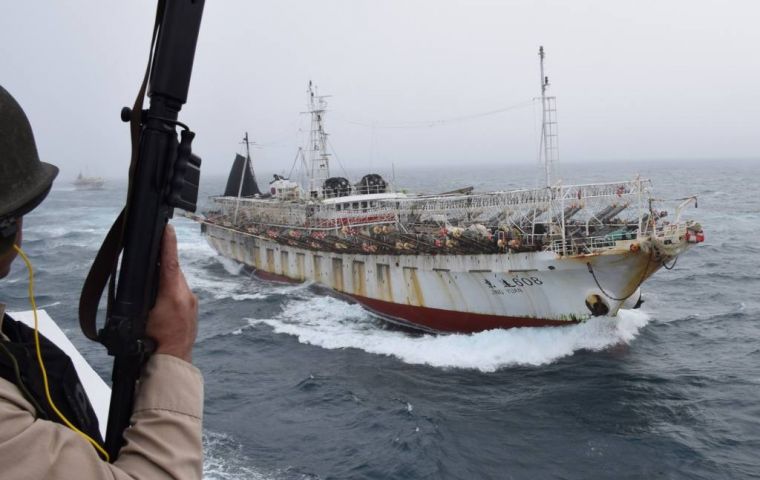MercoPress. South Atlantic News Agency
Illegal and unregulated fishing costs Argentina “one to two billion dollars”: Falklands the main culprit
 Rattenbach mentions that besides influencing negatively the Argentine fishing industry, the 'depredation' also means loss of direct and indirect jobs for Argentine workers
Rattenbach mentions that besides influencing negatively the Argentine fishing industry, the 'depredation' also means loss of direct and indirect jobs for Argentine workers Illegal, unregulated fishing mainly in the waters adjacent to the disputed South Atlantic islands of the Falklands, South Georgia and South Sandwich costs Argentina an estimate of anywhere from one to two billion dollars, according to CEO Eduardo Pucci, from OPRAS, an Organization for the Protection of Fishery Resources.
Pucci point to three main factors, illegal fishing, in absence of (Argentine) licenses; non declared fishing and non regulated fishing. Volumes for each category are between 200,000 and 400,000 tons for illegal fishing while non regulated outside the EEZ is estimated in 300,000 tone.
In the Falklands/Malvinas, the illegal fishing by the UK dates back to 1986, when London allowed the Islands to award and trade fishing licenses. “Since then the economy of the Islands has changed drastically, fisheries became the main industry, with 90% of exports and annual revenue of some ”500 million dollars“. The statement belongs to Juan Augusto Rattenbach head of the Malvinas Museum, according to a piece published in the government's news agency Telam.
The article goes on to enumerate the three bills passed by Congress referred to the special Malvinas advisory Council, the extension of the Argentine ocean shelf from 200 to 230 miles, and the new fines for illegal fishing which are based on liters of fuel.
Even when the new borders of the Argentine continental shelf add some 1,782 million square kilometers, under the US Law of the Sea, ”the extension refers to natural resources, a great geopolitical potential, however it has no incidence on fisheries resources beyond the 200 miles“, underline Rattenbach and Pucci.
The article also recalls that a few weeks ago the Fisheries Under Secretary said that combating illegal fishing was ”an absolute priority“ for the Argentine government, and this refers particularly to ”what is going on in the Malvinas waters“
Rattenbach mentions that besides influencing negatively the Argentine fishing industry, the 'depredation' also means loss of direct and indirect jobs for Argentine workers, plus additional industries such as vessel building and the maintenance of the fleet.
Besides ”in adjacent waters the only vessels that comply with the regulations are the Argentine, the rest violate cooperation, disregard respect for the ecosystem and ignore responsible catches, and not to mention conservation measures“, added Pucci.
”It is also essential to regulates fishing in the area adjacent to the Argentine EEZ because they are mostly migrant species, and this means the coastal state provides the fish and those outside the 200 miles take unregulated advantage of the resource”




Top Comments
Disclaimer & comment rules-

-

-

Read all commentsSounds like a lot of “Sour Grapes” !! to Me, I suppose They could try patrolling that area of the Sea and then see how quickly the Royal Navy arrives to chase them out.
Aug 24th, 2020 - 08:41 am +2Thibnk Rathead will find that there is more regulation and freely available catch statsitics for the Falklands EEZ than there is for the Argentine one.
Aug 24th, 2020 - 10:03 am +2An until Madam “hissy-fit” threw the dolly out of her pram for her 2nd time- FIG used to formally pass all that into the the Arg Fisheries commission and both countries co-operated on statistics and procedures to prevent overfishing- and illegal fishing by outsiders.
Do please at least make an effort at growing up Argentina.
First the oil, then fisheries, next they'll be whinging about tourists. I fail to understand how this trawling can be illegal. Perhaps we ought to make a claim to the sea adjacent to the FICZ. These fishing boats are outside their jurisdiction. They could as easily whine about anywhere else. They would do as well to stop the illegal fishing in their own waters before they start encroaching on Falklands waters.
Aug 24th, 2020 - 09:43 am +1Commenting for this story is now closed.
If you have a Facebook account, become a fan and comment on our Facebook Page!